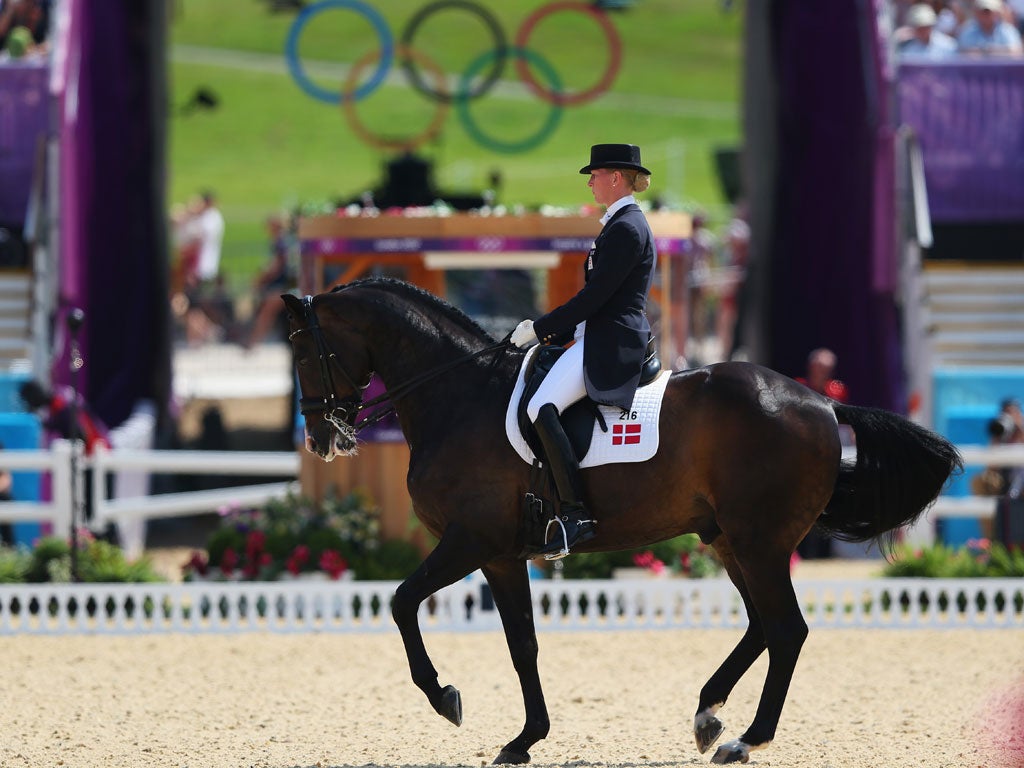A rugby man enjoying dressage? I nearly had to draw the curtains

It is a common joke in the distinctly uncommon world of dressage, where even the most serious riders have occasionally been known to laugh despite being asked to perform minor miracles on horseback while dressed in outfits that would guarantee them podium finishes in the Monty Python Upper Class Twit of the Year contest, that the only thing worse than a rubbish display is an entertaining one.
Dressage judges were not put on this earth to be amused, still less surprised: the pleasure they seek is found only in order, in method and in predictability, all of it measured against an ideal of perfection. Which makes this sternest of disciplines as forbidding as it is exacting – the sporting equivalent of construing Latin verbs. Does it therefore follow that dressage is dull? No, weirdly. If most of us would, given the choice, be more tempted to watch Usain Bolt run a 200m final than Nathalie Zu Sayn-Wittgenstein perform a pirouette on an animal weighing more than an entire ballet troupe, it does not automatically follow that the least popular, least understood of equestrian disciplines is best avoided.
The rank and file of the Socialist Workers' Party will feel uncomfortable with the thought, but the horsey stuff must surely be counted among the highlights of these Games. The climax of the eventing competition, that supreme test of horse and rider, was close to mesmerising – you did not have to be born with a riding crop for a right arm to feel desperately sorry for the Swedish challenger Sara Algotsson Ostholt when she lost the gold medal in the very last act of a punishing three-day campaign – and there is something in showjumping's DNA that generates a high level of sporting tension whenever a big prize is there to be claimed.
Yesterday, dressage had an opportunity to make a dramatic point of its own to Mr and Mrs Ordinary of Nowhere-in-Particular: quite a challenge, admittedly, as the names on the competitors' list appeared to confirm that at the end of the First World War the aristocracy of the Austro-Hungarian empire moved en masse to a nice big castle with its own stables in a far-flung part of Bohemia and now re-emerges once every four years just to check that it is still 1913.
Could it produce the best of itself on a day when all the necessary patriotic elements were in place, thanks to the presence of Laura Bechtolsheimer, Carl Hester and the apparently nerveless Charlotte Dujardin at the top of the leader board?
These three had already secured gold in the team event, thereby ending decades of German domination, and if this remarkable success did not give the average British sports nut quite the frisson it might have done when the Basil Fawlty approach to international relations was still in vogue – on the morning of the 1966 World Cup final between England and West Germany, one old-school journalist expressed the view that if "we are beaten at our national game today, we can always console ourselves that we have twice beaten them at theirs" – it was a moment roundly celebrated by those who understood what they were watching.
So it was that the 18 best-performing combinations from the "grand prix special" on Tuesday embarked on the decisive "grand prix freestyle" test: six minutes of extended trots and piaffes and passages, performed to the kind of musical arrangement that would have tied Torvill and Dean in knots.
And after a brief, barely controllable urge to draw the curtains shut for fear that watching television coverage of a dressage competition on a warm summer's afternoon might be considered an arrestable offence, this viewer found himself engrossed. Now, there's an admission for a rugby correspondent to make.
Certain Olympic activities will always beggar belief. Only one man on the planet may be able to cover a sprint distance at Bolt-like speed, his name being Bolt, but the rest of us at least understand how he does it. The high jump? That's different. It is no easier to work out how a mere human might clear a bar positioned eight feet above the ground than it is to fathom how a female gymnast performs a somersault on a suspended piece of wood four inches wide. Dressage is a little like that: unimaginably difficult.
It goes without saying that those who participate are either blessed with considerable wealth of their own or have close connections with people who are not at immediate risk of running out of Château Petrus (early in the equestrian programme, one commentator could be heard pondering the identity of a minor royal personage in the crowd. "Is that a Danish princess, does anybody know?" he asked, not quite as off-air as he thought he was).
But even the great unwashed might see something in this dressage lark when a rider performs a routine to a collection of raucous numbers by The Who, as Tinne Vilhelmson Silfven of Sweden did here.
"A slight loss of balance, I think," said the BBC analyst Judy Harvey as the last notes of "Won't Get Fooled Again" drifted away on the lightest of breezes. Well… we've all been there. Pray God the good Mrs Vilhelmson Silfven treats her horses better than Pete Townshend treated his guitars.
Subscribe to Independent Premium to bookmark this article
Want to bookmark your favourite articles and stories to read or reference later? Start your Independent Premium subscription today.

Join our commenting forum
Join thought-provoking conversations, follow other Independent readers and see their replies